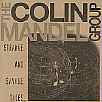I use a great deal of Odd meter in my writing and soloing. The majority of songs on my latest CD, "Strange and Savage Tales..." (bass fans - Jimmy Johnson does some exquisite playing on this CD). I will show some examples below from my upcoming CD, "Seismic Undertow", my first release, and some examples from my latest CD, "Strange and Savage Tales..."
Most of the songs on "Strange and Savage Tales employ odd meter, as well as demonstrate some nice ideas to employ odd meter on the guitar. Don't let odd meter ideas intimidate you by their look on paper. All odd meter ideas, regardless of the time signature, can be sub-divided into simple groups of twos and threes, which makes breaking them down quite simple!
Example 1. Is from my upcoming CD, "Seismic Undertow". The time signature of 3/4 , (3 quarter notes per bar). It is not complex or compound, and thus can not be broken up into groups of 2 and 3 like other odd time signatures, but it is considered an "odd meter" (not divisible by two). Traditionally this time signature was used in waltz, however in today's modern music, in all styles, it has proved to be quite versatile, and contain many feels. This example employs a nice arpeggiated chord part. Make sure that all notes ring into each other for the full duration of the bar.
Example 2. Is also from the upcoming CD, and makes use of the time signature 5/4 (5 quarter notes per bar). The feel of the duration of the beat is what determines the lower denominator in a time signature: In this case the quarter note delivers the pulse, with five per bar creating a 5/4 feel. The subdivisions will help in counting out this rhythm.
Example 1: From Upcoming CD "Seismic Undertow" - "The Receding Dream" © 2000 by C. Mandel

Some things to keep in mind: For most musicians, being able to create chord or melody phrases in 4/4 comes quite naturally. Most likely you do not have to count beats or figure out how many quarter or eight notes per bar. You most likely find it easy playing ideas in 4/4. This comes mostly from years of listening to music, since most music is in 4/4 time signature, giving this time signature the name of "common time". With practice these and other odd time signatures will also feel natural and will require no thinking to phrase accurately and easily to play and improvise in.
Example 2: From "Colin Mandel"- "Franklin Street" © 1994 By C. Mandel

One way to really ingrain odd time signatures in your head is to use a sequencer and record some grooves of bass, drums, and maybe keyboards in one odd meter, and practice improvising creating melodic and chordal ideas over the groove. Work with one groove for 10-20 minutes, and by the end of that time, you should start to be able to come up with some ideas naturally. Listening to music that uses these ideas will accustom your ears to the many feels that can be created using odd meter, and with time it will become instinctive in the same way what you are playing now is.
Unfortunately there is not a lot of music being played that makes use off odd meter. It has always surprised me that the vast myriad of feels and textures that exist in odd meter have not been more explored. I never think about time signatures when writing, it just turns out that way.
The secret of effective odd meter writing is to have your phrases sound natural and uncontrived. In the 70's, odd meter was somewhat popular with the fusion groups of the day. The music was great for the time and paved the way for future odder meter use, but tended to be a bit abrasive, and seems a quite contrived use of odd meter. The most effective odd meter is smooth, and comes off sounding simple, as if it was in 4/4. Some artists worth listening to that use this are Bill Bruford, Allan Holdsworth, and The Dixie Dregs, as well as some of the great orchestral composers such as Bartok and Stravinsky.
The late Colin Mandel was a guitarist out of Los Angeles and a graduate of the Berklee College Of Music.
During his career he had been featured as new talent in Guitar Player and Guitar World Magazines.
His instrumental CD is entitled "Strange and Savage Tales...".
